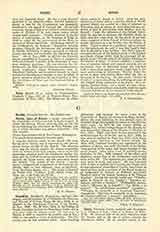

Gloria, Laus et Honor, a hymn composed by St. Theodulph of Orleans in 810, in Latin elegiacs, of which the Roman Missal takes the first six for the hymn following the procession on Palm Sunday (the use to which the hymn was always dedicated). The first couplet,
Gloria, laus et honor tibi sit Rex Christe, Redemptor, Cui puerile decus prompsit hosanna pium,
is sung by chanters inside of the church (the door having been closed) and is repeated by the processional chorus outside of the church. The chanters then sing the second couplet, the chorus responding with the refrain of the first couplet and so on for the remaining couplets until the subdeacon strikes the door with the staff of the cross whereupon the door is opened, the hymn ceases, and the procession enters the church. The words of the refrain (“puerile decus”) suggested the assignment of the hymn in the Middle Ages to boy chanters (thus at Salisbury York, Hereford, Rouen, etc.). The hymn is founded on Psalm xxiii (Vulgate), 7-10; Psalm cxvii, 26; Matt. xxi, 1-16; Luke xix, 37-38.
H. T. HENRY

